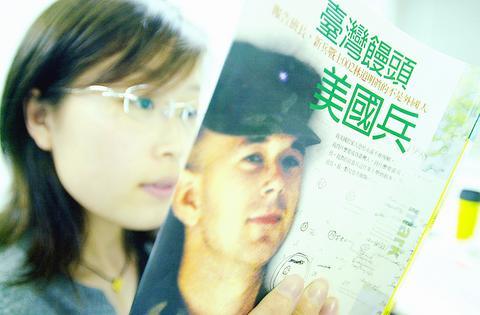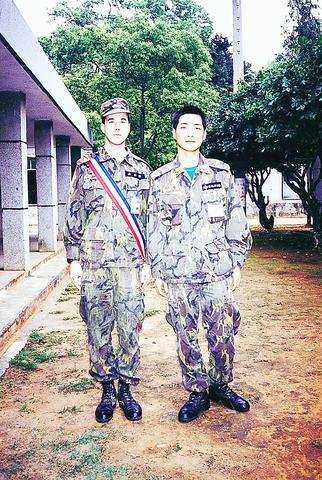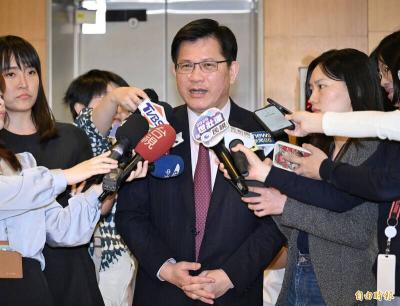For most Taiwanese men, military service is a common experience and one of the most popular topics in conversations when meeting new acquaintances or getting together with old friends.
It is not something that most foreign men in Taiwan would be able or willing to talk about -- unless that foreigner happens to be an American called T. C. Locke.

PHOTO: TAIPEI TIMES
Locke, whose Chinese name is Lin Dao-ming (

PHOTO: COURTESY OF T.C. LOCKE
Despite his obvious distinctness, Locke's experience -- as told in his recently published book, Counting Mantou: An American in the Taiwanese Army -- was much the same as that of other conscripts. In his retelling of those common experiences, Locke manages to transcend the cultural and ethnic differences, making him, in Taiwanese eyes, "one of us."
Locke was not the first naturalized foreigner to serve in the Taiwan military. What makes him different from his predecessors is that he is willing to share his experiences with the public.
In a recent interview, Locke said that he considers Taiwan as his home and that his military service here could have been "the most important part of my life."
Locke's experiences in the military are not so different from those of other conscripts who went before him. After all, life in the military does not really change that much over the years.
As a draftee, Locke first had to receive several months' basic training at a boot camp in Hsinchu. Days at the boot camp are vividly remembered by most conscripts because of constant yelling from drill sergeants who have a reputation for dishing out a steady diet of verbal abuse
At the boot camp, Locke had his first experienced with political education -- military style. The curriculum included a watching a weekly TV program and writing a short essay that would be read by his commanding officers.
Watching the weekly political education program is compulsory for service members of all ranks and is a practice which has been enforced for several decades.
The program, essentially military propaganda, runs each Thursday morning on television station CTS, which is owned and controlled by the Ministry of National Defense.
For most conscripts, including Locke, the program is very boring but still welcome because it provides a 90-minute escape from daily chores.
Writing a short essay each week is another part of the political education. The job did not seem to be difficult for Locke, since he was able to write in Chinese.
One of the essays Locke wrote at the camp was called How to Prevent Escapes from Happening. In the essay, Locke wrote that there were, of course, service members who wanted to escape. However, he wrote, if all the rules were fair and reasonable, no one would feel a compelling need to attempt an illicit escape.
The political education Locke received at the boot camp stayed with him for the rest of his service. But what he experienced after the boot camp is the part most conscripts talk about among themselves, even many years after they have been discharged.
After the boot camp, Locke was assigned to an army division in Miaoli and thus began his life as a regular soldier.
Like any other rookie soldier who reported to his unit, Locke experienced that first night what most new soldiers feared: "the shock and awe education."
This initiation ritual visited upon the newcomers by the senior soldiers has been around for many years and is almost the same from one unit to another across the three services.
On the night the rookie soldiers arrive at their posts, the senior soldiers would ask these recruits to unpack all their personal belongings for inspection and to do as many push-ups as possible.
Such practices, though technically not allowed, has been tolerated in the military since commanding officers are few in number and have to rely on senior soldiers to help keep things going.
Locke does not complain about the practice, which seems to him to be only part of the process of becoming accepted in the military.
"Military service helped me learn how to deal with things. I met both bad guys and good guys in the military," Locke said.
"I learned from the military the spirit of comradeship and cooperation," he said. "This spirit seems to be missing from people outside the military."
Another observation that Locke makes is that the Taiwan military has copied a lot from the US military, but only superficially.
"The Taiwan military is in essence still a Confucian hierarchy," he said.

Taiwan would welcome the return of Honduras as a diplomatic ally if its next president decides to make such a move, Minister of Foreign Affairs Lin Chia-lung (林佳龍) said yesterday. “Of course, we would welcome Honduras if they want to restore diplomatic ties with Taiwan after their elections,” Lin said at a meeting of the legislature’s Foreign Affairs and National Defense Committee, when asked to comment on statements made by two of the three Honduran presidential candidates during the presidential campaign in the Central American country. Taiwan is paying close attention to the region as a whole in the wake of a

President William Lai (賴清德) has appointed former vice president Chen Chien-jen (陳建仁) to attend the late Pope Francis’ funeral at the Vatican City on Saturday on his behalf, the Ministry of Foreign Affairs said today. The Holy See announced Francis’ funeral would take place on Saturday at 10am in St Peter’s Square. The ministry expressed condolences over Francis’ passing and said that Chen would represent Taiwan at the funeral and offer condolences in person. Taiwan and the Vatican have a long-standing and close diplomatic relationship, the ministry said. Both sides agreed to have Chen represent Taiwan at the funeral, given his Catholic identity and

Chinese Nationalist Party (KMT) Chairman Eric Chu (朱立倫), spokeswoman Yang Chih-yu (楊智伃) and Legislator Hsieh Lung-chieh (謝龍介) would be summoned by police for questioning for leading an illegal assembly on Thursday evening last week, Minister of the Interior Liu Shyh-fang (劉世芳) said today. The three KMT officials led an assembly outside the Taipei City Prosecutors’ Office, a restricted area where public assembly is not allowed, protesting the questioning of several KMT staff and searches of KMT headquarters and offices in a recall petition forgery case. Chu, Yang and Hsieh are all suspected of contravening the Assembly and Parade Act (集會遊行法) by holding

Taiwan would welcome the return of Honduras as a diplomatic ally if the next president of that country decides to make such a move, Minister of Foreign Affairs Lin Chia-lung (林佳龍) said today. “We would welcome Honduras if they want to restore diplomatic ties with Taiwan after their elections,” Lin said during a legislative hearing. At the same time, Taiwan is paying close attention to the Central American region as a whole, in the wake of a visit there earlier this year by US Secretary of State Marco Rubio, Lin said. Rubio visited Panama, El Salvador, Costa Rica and Guatemala, during which he